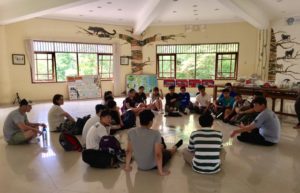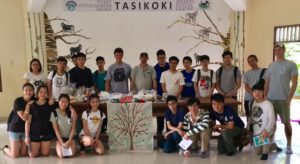On May 7th 2017 Victoria Shanghai Academy travelled from Hong Kong to Manado to start their week long CAS experience at Tasikoki. The school was warmly welcomed by the Masarang Foundation Team as Tasikoki Wildlife Rescue and Education Centre urgently needs the support and extra hands to help, as well as keen individuals to raise awareness of the importance of the work being done at the centre.


Please find below 2 reflections from the young VSA environmentalists. One reflection details the day to day experience and one reflection details the efforts by the wish list team to collect relevant items.
The VSA staff and students worked hard, did their best and made a meaningful contribution to the work being done at Tasikoki.
We look forward to their return!
Masarang HK Volunteer
Justin’s Reflection
Day 1:
The first 2 days (including transport) of my Masarang CAS trip is exhausting but inspiring. Although we had only travelled, only gone through the introductions, and did only one of the many planned activities, I can already tell how different and rewarding our experience will be for the upcoming five days. I believe this trip is great for CAS as it greatly contrasts with Hong Kong’s lifestyle and has a big impact. All in all, it is a tiring, but fresh 2 days.
Day 2:
Today is unfortunate that we are not able to go to the beach due to the thunderstorm, but we did enrich the Sun bear’s living space and it got me to think that in fact the sunbeam’s habitat would already be sufficient for humans to live in. I realized that our yearn for a “better” life is quite pointless –– especially, when reversing or downgrading” is torture-like. This experience really inspired me to think about all what exactly made the society the way it is today.
Day 3:
Today is more about learning instead of participating in the work: today we visited the palm sugar factory and observed how palm tree are tapped in a sustainable way, how the the juice is converted to fuel (alcohol) and sugar. This allowed me to learn how Masarang foundation is able to create profit from natural resources in a very sustainable way, so sustainable that it is restoring the natural habitat that is a blooming rainforest like back in the 1980s. We then visited the Mahawu volcano which is formed as the pacific tectonic plate and the philippine tectonic plate collided. This visit allowed me to physically observe the interactions of tectonic which is covered greatly in my ESS lessons, allowing me to grasp a better idea of the interactions. We also participated in some local cultural activities and planted more sugar palms at the Rurukan village for cultural exchange. All in all, I would say today is a fun and rewarding day.
Day 4:
Today we had is another working day for us –– we woke up early to work on foraging browse, jungle salad, and bugs. We then worked enrichments for different animals afterward. For my group, we did enrichments on birds, mainly on cockatoos. We made food for them and fed them. Afterwards, we worked on enrichments for the orangutans: we cut bamboo, we created nets from tires, we made toys for them…… This allowed us to learn more about the animals’ habitats and their interactions. Afterwards we also did a beach cleanup, spread some seeds, and walked on the beach towards the Tulap Turtle breeding site (which is located on that 1km long beach). This further allows us to observe how the ecosystem in tropical rainforests work and I had learned a lot from both CAS experience and ESS materials.
Day 5:
Today is essentially a snorkelling trip where we observe the aquatic ecosystem of Manado. We snorkelled at 2 sites and we managed to observe many difference species: including (obviously) coral reefs, a variety of fish, and surprisingly an abundance of sea turtles, which is a good thing, as there is a lot of this endangered species. However, I also observed huge patches of bleached (dead) coral reefs, which just shows that how pollution and carbon dioxide emissions are effecting the aquatic systems (CO2 has an equilibrium reaction with water which forms carbonic acid). We also discussed afterwards such observations and we had strengthened our understanding on ecosystems and how our actions affect the environment.
Day 6:
Today is our last day at Tasikoki before returning to Hong Kong. Today we only had time to visit a local school near the Tasikoki village. At the school, we did some activities related to our global values, ethics, and knowledge on environmental systems. There is also a show for us that highlights their cultural values and practices and all in all it is a very nice cultural exchange experience. From today’s experience I learned a lot more about the values of the people of a LEDC and learned that they resonate greatly with their culture values –– a lot of the things I saw in them I do not see in people from MEDCs, and of course I do not see things from MEDCs in them too. My considerations when thinking about ethical topics had changed greatly from this experience.
Wish list Team Reflections
Wish list Team members: Lincoln Tong, Linus Lim, Wai Lam Leung, Jonathan Chung, Ernie Lee, Luca Law
The following entries demonstrate and trace the work done by the Wishlist Team starting from fundraising activities to purchase wishlist items and ultimately bringing them to Tasikoki. On the whole, we are quite successful in gathering quite a lot of resources for the Masarang Foundation. In particularly, we are pleased to actually feed the animals with the food we brought from Hong Kong and also witness our hard work in gathering the resources worth it. After visiting the Tasikoki animal care centre, we realised that the Chinese seeds are very favourable for the animals over there. Therefore, in the future, we will host resource collection sections, especially the post Chinese New Year period to collect any unwanted or leftover festive seeds that can be enjoyed by animals in Tasikoki
As the Wishlist Team of the Masarang Trip, we need to do fundraising activities to purchase the Wish list items, such as bird seeds, dried fruits and dried nuts. As a group, we have decided to hold a booth during Family Fun Day by selling chocolate snacks and some candies. These were the goods that we will sell because we think these goods can be preserved easily and stored easily without much constraint on the time to sell and storage space. Therefore, we have bought around 2000 dollars of snacks in total and we aim to earn about 500 dollars profit from it. We worked collaboratively and discussed thoroughly about the price of different food for sale. As a result, we have come to an agreement of a list of prices and the amount of good we will sell. In addition to Mr. Brewer’s request, we will prepare a dance game to attract people on our stall. Overall, we think we have shown our commitment and inputted our energy in preparing for the charity sell. We hope that we can make some profit and use those profits to buy Wish list items.
12/3/2017:
Today is the Family Fun Day. We have split our team into two to be responsible for the booth at two sections so that we can be more efficient in man power. Our booth is set up in the morning 10 am and got ready very soon as we have well planned for the event. At the beginning, the dance game is not quite attractive because people were a bit shy. However, as more and more crowd comes by, they started to enjoy the dance game and people got interested in our products. We think we have initially set the prices for candies and chocolates too high. Therefore, not much revenue is made in the morning. However, we started to earn a bit more as we sell the chocolates mobile and also at a low price. We sold the chocolates at five dollars for three pieces. This idea is quite successful and a made more revenue since then. At the end of the day, we still have half of our stocks not yet sold. Therefore, we might need to organise another sale later during the week to maximise the revenue.
13/4/2017:
Today is the Chinese Culture Day in school, which our Masarang Wishlist team treasured the chance to do more charity selling so that we have more money to prepare more Wishlist items. Just like the one we did in Dollar a Day, we will be selling some candies and chocolate. Fortunately, another team working on the t-shirt design has volunteered to help us to earn more money by selling Siu Mai. These Siu Mai do not have any cost because they are the leftover storage from Yangtze’s booth on Dollar a Day. Therefore, it will be very profitable for us when we sell these items. Through this experience, it showcases how engaged we are in being aware of the needs for nature conservation in Tasikoki and at Masarang Foundation projects.
During the selling process, our team worked collaboratively in small groups that are in-charge of the booth rotationally during the day. Thus, our sales are quite smooth and is positive to our charity funding. In particular, the Siu Mai are quite great in demand. Many students enjoyed the food. As a result, we are able to sell over two big packs of Siu Mai at the basis of not having any cost. Our cooperation in the team includes good communication, good organisation and good collaboration. With such a great success, we are able to collect a net profit of over 600 dollars. After this event, we will decide what Wishlist items we will buy to bring to Tasikoki.
Leave a Reply